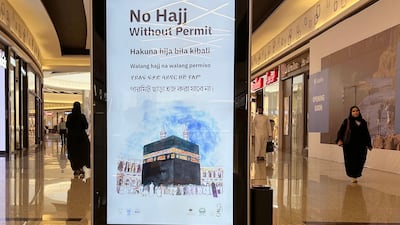Saudi Arabia has refused entry to more than 300,000 people who arrived in Makkah but did not register for a permit to perform Hajj this year.
These include 153,998 people who arrived on tourist visas instead of Hajj visas, the Saudi Press Agency said on Monday.
The Saudi Ministry of Interior said that during the past week, authorities have stopped 140 fake Hajj campaigns and 64 carriers for breaching the regulations and instructions for the Hajj this year.
They also said they turned away 97,664 vehicles carrying pilgrims without a valid permit.
Crowd management is a major concern during Hajj season. More than 1.8 million Muslims performed Hajj last year, according to official figures.
Hajj is the annual Islamic pilgrimage to Makkah in Saudi Arabia. All Muslims able to do so are required to make the pilgrimage at least once in their lifetime
Hajj is one of the five pillars of Islam, in addition to the profession of faith, prayer, almsgiving and fasting.

New initiatives
Saudi authorities are finalising their preparations to host more than 1.5 million pilgrims who will undertake their Hajj pilgrimage this week.
In a bid to ease the journey to the Holy city of Makkah, newer roads have been paved using flexible rubber asphalt.
“Experiments have demonstrated that the hardness of standard asphalt surfaces and sidewalks causes discomfort and issues for the ankles and feet of pilgrims, especially the elderly, who comprise 53 per cent of the total pilgrims,” said Saudi Minister of Transport and Logistic Services Saleh bin Nasser Al Jasser.
Pilgrims will mainly use the newly paved roads on the road parallel to the pedestrian path leading to Mount Arafat, the site of the penultimate day of the pilgrimage where pilgrims will spend the day in prayer.
“The use of this technology is expected to reduce pressure on the ankles and feet, providing a sense of comfort while walking, ultimately leading to an improvement in the public health of the pilgrims and enhancing their quality of life,” Mr Al Jasser said.
Hajj amid the Gaza war
This year’s Hajj will be marked amid conflicts in the region, including Israel’s war on Gaza, which has killed more than 37,000 Palestinians since October.
Saudi Arabia’s King Salman bin Abdulaziz, who is the Custodian of the Two Holy Mosques, ordered authorities to arrange the hosting of 1,000 pilgrims from the families of those who were killed and injured in the enclave.
So far this year, 2,508 Gazans have registered as pilgrims out of about 6,600 Palestinians who intend to travel to Saudi Arabia for Hajj. According to the Palestinian Ministry of Awqaf and Religious Affairs, 2,000 men and women from the occupied West Bank have travelled to Jordan on 69 buses, on their way to Saudi Arabia, while another 1,200 people will fly to the kingdom.
“This exceptional hosting is a support and relief for what the Palestinian people are suffering in the Gaza Strip, and this humanitarian gesture is not strange for Saudi Arabia to stand side by side with the Palestinian people,” said Minister of Islamic Affairs Abdullatif bin Abdulaziz Al Al-Sheikh.


